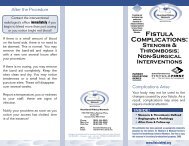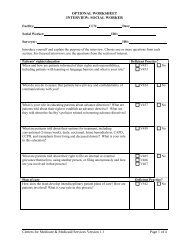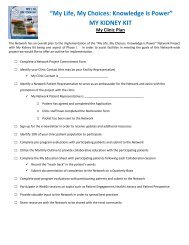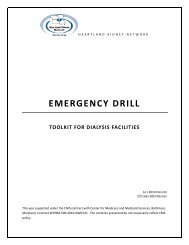complaints and grievances - Heartland Kidney Network
complaints and grievances - Heartland Kidney Network
complaints and grievances - Heartland Kidney Network
You also want an ePaper? Increase the reach of your titles
YUMPU automatically turns print PDFs into web optimized ePapers that Google loves.
Things the <strong>Network</strong> may be able<br />
to do:<br />
•Investigate a complaint/grievance<br />
•Contact your dialysis facility or<br />
transplant center to discuss your<br />
complaint/grievance.<br />
•Educate the staff <strong>and</strong>/or you about<br />
issues related to the complaint/<br />
grievance.<br />
•Refer the complaint/grievance to<br />
another appropriate agency.<br />
•Visit the dialysis facility or transplant<br />
center to provide mediation.<br />
•Be an advocate for patient rights.<br />
•Provide you with names <strong>and</strong> contact<br />
numbers of professionals you can<br />
speak to at your clinic’s corporate<br />
offices.<br />
•Provide you with information on<br />
Medicare regulations <strong>and</strong> your<br />
rights under Medicare.<br />
Things the <strong>Network</strong> cannot do:<br />
•Request or force a dialysis facility;<br />
transplant center, or physician to<br />
accept a patient.<br />
•Request that a specific staff member<br />
provide your care.<br />
•Change or get involved in facility or<br />
personnel policies <strong>and</strong> procedures.<br />
•Get a physician or staff member<br />
“fired” or transferred.<br />
Heartl<strong>and</strong> <strong>Kidney</strong> <strong>Network</strong><br />
7306 NW Tiffany Springs Pkwy<br />
Suite 230<br />
Kansas City, MO 64153<br />
Phone: (800) 444-9965<br />
Main Fax: (816) 880-9088<br />
Data Fax: (816) 880-1775<br />
Web:<br />
Email:<br />
heartl<strong>and</strong>kidney.org<br />
net12@nw12.esrd.net<br />
Patient<br />
Information<br />
Series<br />
<strong>complaints</strong><br />
<strong>and</strong><br />
<strong>grievances</strong><br />
Promoting <strong>and</strong> facilitating high quality care st<strong>and</strong>ards for dialysis <strong>and</strong><br />
kidney transplant patients in Iowa, Kansas, Missouri <strong>and</strong> Nebraska.<br />
Patient<br />
Education<br />
Series<br />
ESRD <strong>Network</strong><br />
Responsibilities<br />
Federal regulations require dialysis facilities<br />
to ensure that patients are aware of their<br />
rights <strong>and</strong> responsibilties, including their<br />
right to process a grievance.<br />
The <strong>Network</strong> believes that every patient<br />
should receive quality care.The <strong>Network</strong><br />
is available to help patients who have<br />
<strong>complaints</strong> regarding the quality of care<br />
provided in their dialysis unit. The <strong>Network</strong><br />
role is to serve as an investigator, facilitator,<br />
coordinator, <strong>and</strong>/or educator.<br />
INSIDE!<br />
Complaint & Grievance Procedures<br />
Additional Help<br />
Things the <strong>Network</strong> can do<br />
This resource was developed while under contract with Center for Medicare & Medicaid Services<br />
(CMS), Baltimore, Maryl<strong>and</strong>. Contract #HHSM-500-2006-NW012C.<br />
The contents presented do not necessarily reflect CMS policy.
Complaint <strong>and</strong> grievance procedures<br />
As a dialysis patient, it is important to know<br />
what to do if you have a complaint or issue with<br />
the level of care that you receive. Here are<br />
some frequently asked questions that relate<br />
to h<strong>and</strong>ling <strong>complaints</strong> <strong>and</strong> <strong>grievances</strong>.<br />
What exactly is a “complaint”<br />
A complaint is a request for a assistance<br />
regarding concern(s) about ESRD issues<br />
including (but not limited to) care, treatment,<br />
or providers.<br />
What exactly is a “grievance”<br />
A grievance is a request for a formal<br />
investigation of a complaint involving an<br />
ESRD healthcare facility, physician, or other<br />
provider.<br />
Who can file a complaint/grievance<br />
Patients,family members, staff or anyone<br />
else who has concerns about a dialysis facility<br />
or transplant center can file a complaint/<br />
grievance. It does not matter if you are on<br />
hemodialysis , peritoneal dialysis, or have<br />
received a kidney transplant. It is always<br />
important to let someone know you have<br />
concerns about your medical care.<br />
What do I do about my complaint<br />
The decision of what to do is always up to<br />
you - the patient. Here are a couple of things<br />
you can consider when trying to resolve the<br />
issue on your own:<br />
•Try talking to someone at the dialysis or<br />
transplant facility where you receive care.<br />
Some of the healthcare team you can talk<br />
to are: social workers, nurses, doctors, <strong>and</strong><br />
clinic managers.<br />
•Submit a facility grievance. Each facility has<br />
it’s own grievance process, which explains<br />
what to do with your complaint within the<br />
dialysis facility or transplant center.<br />
Why should l tell anyone<br />
•To make sure safe care is being provided.<br />
The most important purpose of <strong>complaints</strong><br />
is to protect you <strong>and</strong> other patients. All<br />
dialysis facilities <strong>and</strong> transplant centers are<br />
required to follow guidelines for treatment<br />
under Medicare.When a facility is not<br />
following the guidelines, it is important<br />
for someone to know about it so that the<br />
situation can be improved.<br />
•To work through a problem. Every patient<br />
<strong>and</strong> staff member has a different personality,<br />
so it is possible that there may be a<br />
communication problem at some point. If a<br />
problem is not addressed, it can potentially<br />
become worse. By talking to someone<br />
about your concern, there is a chance that<br />
it will make you feel more comfortable <strong>and</strong><br />
improve communication between staff <strong>and</strong><br />
patients.<br />
•To help others.<br />
What if I need additional help with<br />
the problem <br />
Contact the Heartl<strong>and</strong> <strong>Kidney</strong> <strong>Network</strong><br />
at the address shown on the back of this<br />
brochure. The <strong>Network</strong> acts as a neutral<br />
third party to help mediate concerns.<br />
Mediation means that we will listen<br />
to both sides <strong>and</strong> try to assist each in<br />
reaching the best possible outcome.<br />
Who should I call<br />
The decision of who to call is always<br />
up to the patient. The <strong>Network</strong> has an<br />
experienced staff available Monday<br />
through Friday to listen to you complaint<br />
<strong>and</strong> assist in mediation with your ESRD<br />
healthcare provider. The <strong>Network</strong> can<br />
also assist you in filing a complaint or<br />
grievance.<br />
www.Heartl<strong>and</strong><strong>Kidney</strong>.org








